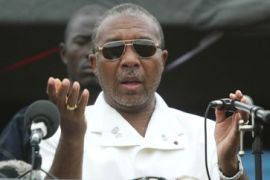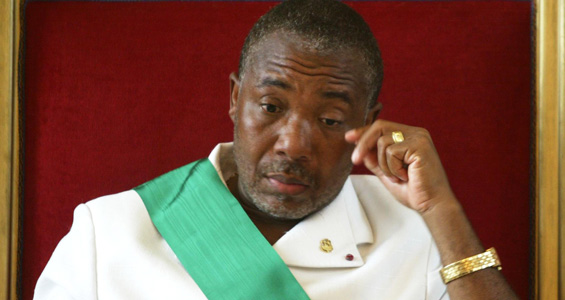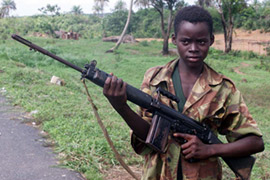Profile: Charles Taylor
He is the first former African head of state to face an international tribunal.

 |
| Taylor resigned the presidency in August 2003 but was handed over to UN officials in 2006 [GETTY] |
Charles Taylor, the former Liberian leader, is considered by some in Africa to be a man of many faces.
To his supporters, he is a Baptist lay preacher who drifted into nationalist politics while studying economics in the US. To others, he is a rebel leader who later became president in Liberia’s first democratic elections.
But he is most likely to be remembered as the first former African head of state to face an international tribunal on charges of crimes against humanity.
In 2003, the Special Court for Sierra Leone (SCSL), an independent judicial body established with United Nations Security Council backing, issued a 17-count war crimes indictment against Taylor for his role in the 1996-2002 civil war which took place there.
The indictment charges that Taylor had used his power and influence in Liberia to support rebel groups who committed atrocities against civilian populations in neighbouring Sierra Leone.
The charges include knowingly supporting, directing and effectively commanding rebel factions, such as the Revolutionary United Front (RUF), who committed “acts of terror, murder, sexual violence, including rape and sexual slavery, physical violence, including amputations, the conscription of child soldiers, enslavement and pillage”.
Prosecutors say that Taylor used the so-called “blood diamonds” trade in Sierra Leone to arm the rebel factions, destabilise its government and boost his regional influence.
The UN estimates that about 120,000 people were killed during the civil war.
Taylor has pleaded not guilty to 11 counts of war crimes and crimes against humanity, including conscripting child soldiers and sexual slavery.
His defence team has argued that the case against their client is “political” and that the SCSL is “a political institution controlled by states opposed to Taylor’s policies”.
Rise to power
 |
| Liberia and Sierra Leone have separately been ravaged by decades of civil wars |
The US-educated Taylor entered the world of politics when he led a demonstration in front of the Liberian Mission to the UN in New York City and publicly debated William Tolbert, the then-president of Liberia, in 1979.
In 1980, Taylor returned to Monrovia, the Liberian capital, after a bloody coup d’etat led by Samuel K Doe, an indigenous army sergeant, deposed and killed Tolbert.
Doe appointed Taylor, who is of mixed indigenous and freed American slave (known as Americo-Liberian) heritage, to the post of director of the General Services Agency, a body which controlled much of the state budget.
But in 1983, Taylor fled Liberia for the US after being accused of embezzling nearly $1m of state funds. In 1984, he was arrested and jailed in the US, but while fighting an extradition order, he managed to escape with four other inmates.
Although they were later caught, he disappeared only to resurface in 1985 in the Ivory Coast, where he had begun to amass men, material and money to return and unseat Doe from power in Monrovia.
In late 1989, he slipped back into Liberia with a token force of 100 men, known then as the National Patriotic Front of Liberia (NPFL). His mixed heritage allowed him to appeal to both Americo and indigenous Liberians.
Taylor also made use of long-harboured animosity between Doe and neighbouring countries such as Burkina Faso and the Ivory Coast, who supplied the rebel leader with arms and funding.
Targeting Monrovia
By July 2, 1990, Taylor’s 10,000-strong army surrounded Monrovia. As the conflict dragged on, the NPFL splintered into several breakaway groups which led to factional fighting and all-out civil war.
It was during this time that news of widespread slaughter and massacres against ethnic groups began to surface.
As the fighting intensified, Nigeria proposed the creation of an armed peace-keeping force, Ecomog, which despite several setbacks was able to broker a ceasefire that led to the country’s first democratic elections.
Taylor was elected president in free and fair elections, though he was accused of intimidating voters.
However, the country had already become fragmented. According to the UN, some 200,000 people had been killed and 800,000 been made refugees in nearly eight years of civil war.
Losing control
 |
| The UN says children as young as eight were fighting during the Sierra Leone civil war [AP] |
In 1999, war broke out again as opposition to his rule mounted and Taylor began to lose control of the country.
Things worsened for the embattled leader when Nigeria led the chorus of neighbouring states who accused Taylor of fomenting the civil war in Sierra Leone by selling weapons to rebel groups in exchange for diamonds smuggled out of the war-torn country.
In March 2003, the SCSL charged Taylor with crimes against humanity.
As he began to lose more control in Liberia, Taylor agreed to resign his post as president in exchange for the deployment of US peacekeepers in Monrovia.
He was then granted asylum in Nigeria. It would be another three years before he was handed over to the UN war crimes tribunal in Sierra Leone.
Although it is the first such international tribunal to be established in the same country where the crimes were committed, Taylor has been on trial at The Hague since June 2007 for fear that his presence in Freetown, the capital of Sierra Leone, could destabilise the region.
His defence team is expected to open their case in The Hague on July 13, 2009.
Taylor will take the stand as the first witness for the defence.